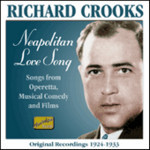
Neapolitan Love Song: Songs from Operetta, Musical Comedy and Films
 $25.00
Out of Stock
$25.00
Out of Stock6+ weeks add to cart
VARIOUS COMPOSERS
Neapolitan Love Song: Songs from Operetta, Musical Comedy and Films
Richard Crooks (tenor)
[ Naxos Nostalgia / CD ]
Release Date: Thursday 5 March 2009
This item is currently out of stock. It may take 6 or more weeks to obtain from when you place your order as this is a specialist product.
Probably the finest lyric tenor America ever produced - and in the 1930s on radio and in opera and concert certainly the most popular
- Richard Crooks was born into a family of modest means, of Scottish and English ancestry, in Trenton, New Jersey on 26 June, 1900. His mother, Elizabeth Gore, herself a gifted amateur singer, gave Richard the boy-soprano his earliest musical education until 1910, when his first serious engagement, as soprano soloist in Mendelssohn's Elijah in his native town, before a 10,000-strong audience, pro-vided the necessary spur to his talent. His stage-partner at that baptism of fire, Ernestine Schumann-Heink (1861-1936), the German-American contralto star of the Metropolitan Opera, predicted great things for her ten-year-old colleague, all of which duly came to pass. Having reached puberty, Crooks began to re-train as a tenor. At fourteen he was already earning his own living, and financed his studies by manual occupations until 1917 when, with the US entry into World War I, he entered the US Armed Forces flying corps.
A year later Crooks was on active service with the US Airforce over France but, the war over, he returned to the USA and continued his vocal studies with vigour, principally (from 1920 onwards) with Schumann-Heink's accompanist, the influential, New York-based pianist-composer and vocal coach Frank La Forge (1879-1953), whose illustrious pupils included Crooks' fellow-Americans Marian Anderson and Lawrence Tibbett as well as the much-admired Spanish soprano import, Lucrezia Bori. Under La Forge's tutelage Crooks first won fame in oratorio (the curriculum in which he would also end his career) and in 1922 the hopeful young tenor sang in nine concerts with the New York Symphony Orchestra under its prestigious conductor Walter Damrosch. The success of these led to a further series of engagements across the States and, indirectly, to his first Victor recording contract, in 1923. In an item from an early session, Red, Red Rose (from incidental music to Rudolph Valentino's 1924 Paramount silent-screen vehicle Monsieur Beaucaire) Crooks simultaneously offers us a fine sample of his youthful voice and a prime early example of recorded film-music.
During 1925 Crooks made his first European concert tour. His venues included London, Belgium, Holland and Germany, where his lieder recitals won him particular acclaim. On his return to the States in 1926 the European reputation he had gained appears to have excited considerable further interest. His voice already had passion and thrust and a certain endearing lyrical quality which most - if not quite all - of his records seem to have preserved for posterity. At home, the public took him to their hearts and further concert successes followed, crowned by two performances of Beethoven's Choral Symphony at Carnegie Hall, under Toscanini, in 1927. Later that same year he embarked on the first of several recital tours of Great Britain, Scandinavia, the Low Countries and Germany which would continue until 1932. Meanwhile, Crooks' growing list of recordings, which hitherto at least comprised mostly popular ballads and items from operetta, distributed on both sides of the Atlantic, were already beginning to sell in such quantities that Victor saw in him an inexpensive replacement in their Red Seal catalogue for McCormack as well as a viable promoter of the latest in film-ballads. Although comprehensive in his art as a recitalist, on records he veered, predictably, towards the popular repertoire.
Tracks:
The Princess Pat: Neapolitan Love Song
Monsieur Beaucaire: Red, Red Rose
Naughty Marietta: Ah, Sweet Mystery Of Life
The Student Prince: Serenade, "Overhead The Moon Is Beaming"
Naughty Marietta: I'm Falling In Love With Someone
The Only Girl: When You're Away
Viennese Nights: I bring a love song
Rio Rita: Rio Rita
The Vagabond King: Only A Rose
The Dubarry: Without Your Love
The Desert Song: One Alone
Zwei Herzen im Dreivierteltakt (Two Hearts In Three-Quarter Time): Just Two Hearts And A Waltz Refrain
Das Land des Lachelns (The Land of Smiles): Yours Is My Heart Alone
and much more